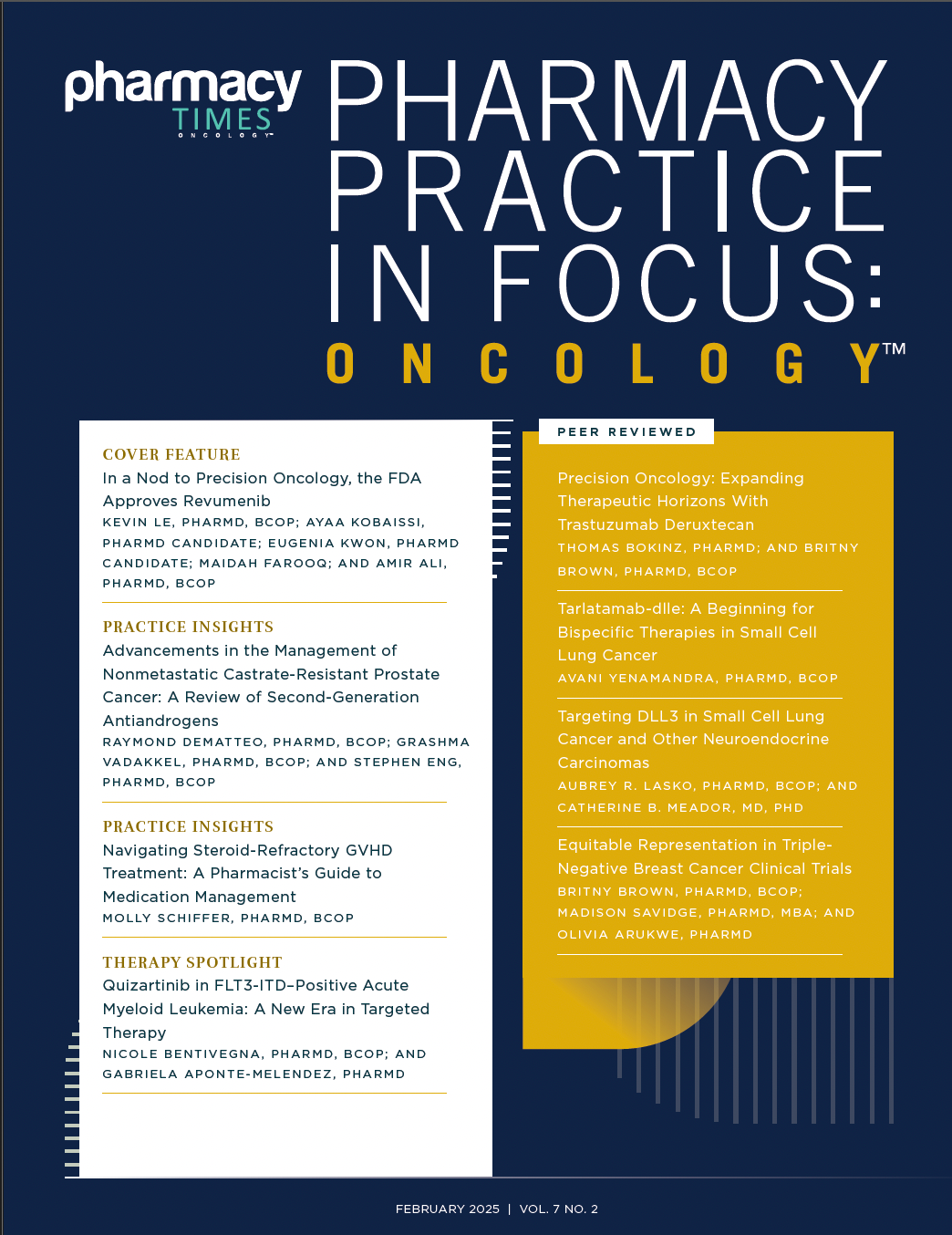Abstract
Chronic graft-vs-host disease (cGVHD) is a late and serious complication of allogeneic hematopoietic stem cell transplant. Although first-line cGVHD therapy consists of corticosteroids, about half of patients will experience steroid-dependent or steroid-refractory disease, necessitating further treatment. The FDA recently approved axatilimab (Niktimvo; Incyte Corporation), a humanized IgG4 monoclonal antibody that inhibits colony-stimulating factor-1 receptor, based on positive results from the AGAVE-201 trial (NCT04710576), which showed a 50% to 74% overall response rate and acceptable tolerability. This review will examine key concepts and takeaways from the AGAVE-201 trial and discuss treatment considerations for patients with steroid-dependent and steroid-refractory cGVHD.
About the Authors
Grashma Vadakkel, PharmD, BCOP, is a bone marrow transplant clinical pharmacy specialist at Memorial Sloan Kettering Cancer Center in New York, New York.
Melinda Cook, PharmD, BCOP, is a bone marrow transplant clinical pharmacy specialist at Memorial Sloan Kettering Cancer Center in New York, New York.
Kristian Casem, PharmD, BCOP, is a bone marrow transplant clinical pharmacy specialist at Memorial Sloan Kettering Cancer Center in New York, New York.
Stephen Eng, PharmD, BCOP, is a bone marrow transplant clinical pharmacy specialist at Memorial Sloan Kettering Cancer Center in New York, New York.
Chronic graft-vs-host disease (cGVHD) is a late complication of allogeneic hematopoietic stem cell transplantation that can occur months to years post transplant and is associated with significant morbidity and mortality.1 The disease develops through a multistep, complex process that includes early inflammation and tissue injury, chronic inflammation and aberrant tissue repair, and fibrosis. It can affect any organ system in the body, exhibiting clinical features similar to systemic sclerosis and interstitial lung disease.2,3 Although cGVHD has been described since the late 1970s, corticosteroids have remained the first-line treatment. Unfortunately, about half of patients with cGVHD will experience steroid-dependent or steroid-refractory disease and will require additional lines of therapy.3 Until recent FDA approvals, therapy for these patients typically relied on provider experience due to limited data. Recent discoveries in cGVHD pathogenesis have resulted in novel therapeutic options for patients with steroid-dependent and steroid-refractory cGVHD. Currently, there are 4 FDA-approved agents for the treatment of steroid-dependent and steroid-refractory cGVHD, with axatilimab (Niktimvo; Incyte Corporation) most recently approved in August 2024.4-7
Axatilimab is a humanized IgG4 monoclonal antibody that inhibits colony-stimulating factor-1 receptor (CSF1R) signaling, blocking the differentiation of CSF1R-expressing monocytes and macrophages. The reduction of circulating pathologic proinflammatory monocytes and macrophages disrupts the transforming growth factor-β–mediated development of fibrosis, thereby reducing the rate of, and in some cases reversing, fibrotic changes associated with cGVHD.2,4
AGAVE-201 Trial
Axatilimab was approved based on the results of the AGAVE-201 trial (NCT04710576). This was a phase 2, international, randomized study that evaluated axatilimab in patients with recurrent or refractory cGVHD. Patients were included if they had active signs or symptoms of cGVHD according to the 2014 National Institutes of Health Consensus Development Project on Criteria for Clinical Trials in Chronic GVHD. Patients were also included if they were previously treated with 2 or more lines of systemic therapy and were aged 2 years or older. Systemic corticosteroids, calcineurin inhibitors, and mechanistic target of rapamycin inhibitors were permitted during the trial; however, other concomitant systemic therapies for cGVHD were required to be discontinued. Patients were excluded if they had relapse of malignancy, posttransplant lymphoproliferative disorder, history of chronic pancreatitis, history of myositis, or uncontrolled infection.2
Patients were randomized to 3 dosing groups according to the severity of cGHVD and previous use of an FDA-approved therapy. These dosing groups included 0.3 mg/kg every 2 weeks (0.3-mg dose group), 1 mg/kg every 2 weeks (1-mg dose group), or 3 mg/kg every 2 weeks (3-mg dose group). Axatilimab therapy continued until disease progression, unacceptable toxicity, or no disease response within 9 months of starting therapy. The primary objective of this study was overall response, which was defined as complete or partial response. The most notable secondary end point was the reduction of symptoms using the modified Lee Symptom Scale.
Results
At the time of analysis, 241 patients were enrolled among the 3 groups: 0.3-mg group (n = 80), 1-mg group (n = 81), and 3-mg group (n = 80). Baseline characteristics were similar across the 3 groups, with most patients experiencing severe cGVHD affecting 3 or 4 organs. The most commonly involved organs were the eyes, lungs, skin, and joints/fascia. Patients had a median of 4 prior lines of therapy, including at least 1 FDA-approved agent (mainly ruxolitinib [Jakafi; Incyte Corporation]), and most were receiving concomitant systemic corticosteroids.2
Axatilimab showed an impressive overall response in 74% of patients (95% CI, 63%-83%) in the 0.3-mg group, 67% of patients (95% CI, 55%-77%) in the 1-mg group, and 50% (95% CI, 39%-61%) of patients in the 3-mg group. A clinically significant reduction in symptoms (defined as a decrease of more than 5 points on the modified Lee Symptom Scale) was reported in 60% of patients in the 0.3-mg group, 69% of patients in the 1-mg group, and 41% of patients in the 3-mg group within the first 6 cycles of therapy. The median time to reduction of symptoms was 1.7 months (0.3-8.6 range), 1.1 months (1-9.3 range), and 1.1 months (0.9-8.0 range), respectively. For organ system response, specifically in the 0.3-mg dose group, notable complete responses were observed in the lower gastrointestinal (GI) tract (90%), upper GI tract (82%), esophagus (65%), and mouth (42%).
Safety and Tolerability
The trial notes that axatilimab was very well tolerated. The most common adverse effects (AEs) included transient laboratory abnormalities not associated with end organ damage. However, there were a few AEs worth noting. Of the 241 patients enrolled in the study, 1 patient in the 3-mg group experienced a grade 3 elevation of creatine kinase that was associated with grade 2 myositis and grade 3 myocardial infarction. Infusion-related reactions were observed in 8%, 5%, and 1% of patients in the 0.3-mg, 1-mg, and 3-mg groups, respectively. Infections were common in 73%, 73%, and 70%, respectively. These infections included COVID-19 (occurring in approximately 20% of patients), cytomegalovirus, Epstein-Barr virus, and invasive fungal infection. AEs that led to dose interruption were observed in 39%, 41%, and 32% of patients in the respective groups. Discontinuation rates were 6% in the 0.3-mg group, 22% in the 1-mg group, and 18% in the 3-mg group. Periorbital edema was also observed.2
Discussion
The results of the AGAVE-201 study supported the FDA approval of axatilimab monotherapy in patients who have received at least 2 lines of systemic therapy with recurrent or refractory cGVHD.4 Axatilimab showed impressive efficacy, with overall response rates occurring in 50% to 74% of patients in a population that consisted of primarily severe cGVHD. Improvement was observed in patients with inflammatory and fibrotic GVHD, and patients reported clinically meaningful improvements in quality of life. In patients with skin cGVHD, not only was symptom control noted, but some patients reported resolution of skin sclerosis after starting treatment. Axatilimab was well tolerated, with toxicities associated with CSF1R signaling including transient elevations of enzyme levels and periorbital edema.2,4 Although high infection rates were noted, these rates are similar to what is expected with other FDA-approved cGVHD therapies.1 Patients should be monitored and provided with infection prophylaxis as appropriate.
Axatilimab’s clinical applicability in the real-world setting is supported by the trial population, which included a majority of patients who had been previously treated with ruxolitinib.2 However, the use of axatilimab in combination with the other current FDA-approved agents and their optimal sequencing remains to be determined. The other current FDA-approved agents for the treatment of steroid-dependent or steroid-refractory cGVHD include ibrutinib (Imbruvica; Janssen Biotech, Inc and Pharmacyclics LLC) after 1 or more lines of systemic therapy, ruxolitinib after 1 or 2 lines of systemic therapy, and belumosudil (Rezurock; Kadmon Pharmaceuticals, LLC) after 2 or more lines of systemic therapy (Table2,4-10).5-7 Current literature recommends sequencing not only by FDA labeling, but by using patient-specific factors, such as GVHD characteristics, costs, provider experience, and AEs. Median time to response may also be considered.3 As therapies for the treatment of cGVHD may take weeks to months before patients experience symptom improvement, it is important to provide organ-specific supportive care modalities and referrals to specialty services (ie, nutrition, dermatology, ophthalmology, etc) for further symptom management. Patients should also be provided with adequate anti-infective prophylaxis, as they experience immunosuppression from the therapies used to treat cGVHD and from cGVHD itself.3
Conclusion
Axatilimab provides a novel mechanism and efficacious next line of therapy in patients with severe cGVHD symptoms who have been treated with at least 2 lines of systemic therapy. More research is needed to determine sequencing and the potential use of axatilimab in earlier lines of therapy. Ongoing studies (eg, NCT06388564, NCT06132256, NCT03604692) are exploring axatilimab in combination with other therapies for cGVHD, using axatilimab in earlier lines of therapy for cGVHD, and examining the use of axatilimab in other fibrotic diseases.12-14
REFERENCES
Hamilton BK. Updates in chronic graft-versus-host disease. Hematology Am Soc Hematol Educ Program. 2021;2021(1):648-654. doi:10.1182/hematology.2021000301
Wolff D, Cutler C, Lee SJ, et al. Axatilimab in recurrent or refractory chronic graft-versus-host disease. N Engl J Med. 2024;391(11):1002-1014. doi:10.1056/NEJMoa2401537
Vadakkel G, Eng S, Proli A, Ponce DM. Updates in chronic graft-versus-host disease: novel treatments and best practices in the current era. Bone Marrow Transplant. 2024;59(10):1360-1368. doi:10.1038/s41409-024-02370-8
Niktimvo. Prescribing information. Incyte Corporation; 2024. Accessed January 14, 2025. https://www.accessdata.fda.gov/drugsatfda_docs/label/2024/761411s000lbl.pdf
Rezurock. Prescribing information. Kadmon Pharmaceuticals, LLC; 2024. Accessed January 14, 2025. https://products.sanofi.us/rezurock/rezurock.pdf
Jakafi. Prescribing information. Incyte Corporation; 2023. Accessed January 14, 2025. https://www.incytepicentral.com/sites/g/files/hssmmz4016/files/2024-07/Jakafi-Prescribing-Information-January-2023.pdf#page=1
Imbruvica. Prescribing information. Janssen Biotech, Inc and Pharmacyclics LLC; 2024. Accessed January 14, 2025. https://www.rxabbvie.com/pdf/imbruvica_pi.pdf?utm_source=google&utm_medium=cpc&utm_campaign=GO-USA-ENG-PS-Imbruvica-BC-PH-RN-HCP_Generic&utm_content=Imbruvica&utm_term=ibrutinib&gad_source=1&gclid=EAIaIQobChMIno6ukdf1igMVcV5HAR3dcw5FEAAYASAAEgLT__D_BwE&gclsrc=aw.ds
Miklos D, Cutler CS, Arora M, et al. Ibrutinib for chronic graft-versus-host disease after failure of prior therapy. Blood. 2017;130(21):2243-2250. doi:10.1182/blood-2017-07-793786
Cutler C, Lee SJ, Arai S, et al. Belumosudil for chronic graft-versus-host disease after 2 or more prior lines of therapy: the ROCKstar study. Blood. 2021;138(22):2278-2289. doi:10.1182/blood.2021012021
Zeiser R, Polverelli N, Ram R, et al. Ruxolitinib for glucocorticoid-refractory chronic graft-versus-host disease. N Engl J Med. 2021;385(3):228-238. doi:10.1056/NEJMoa2033122
Lee SJ, Wolff D, Kitko C, et al. Measuring therapeutic response in chronic graft-versus-host disease. National Institutes of Health consensus development project on criteria for clinical trials in chronic graft-versus-host disease: IV. The 2014 Response Criteria Working Group report. Biol Blood Marrow Transplant. 2015;21(6):984-999. doi:10.1016/j.bbmt.2015.02.025
A study to evaluate the safety and efficacy of axatilimab in combination with ruxolitinib in participants with newly diagnosed chronic graft-versus-host disease. National Cancer Institute. Accessed January 14, 2025. https://www.cancer.gov/research/participate/clinical-trials-search/v?id=NCI-2024-05450
MAXPIRe: study to evaluate axatilimab in participants with idiopathic pulmonary fibrosis (IPF). ClinicalTrials.gov. Updated December 24, 2024. Accessed January 14, 2025. https://clinicaltrials.gov/study/NCT06132256
A study to evaluate axatilimab and corticosteroids as initial treatment for chronic graft-versus-host disease. ClinicalTrials.gov. Updated January 7, 2025. Accessed January 14, 2025. https://clinicaltrials.gov/study/NCT06585774?rank=1








